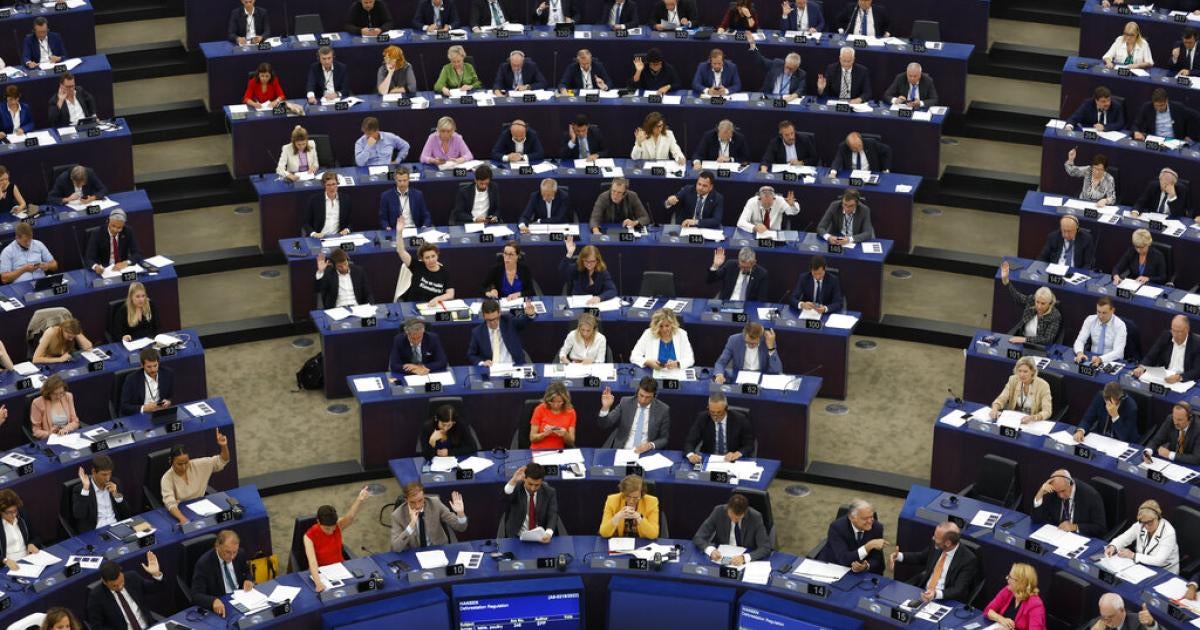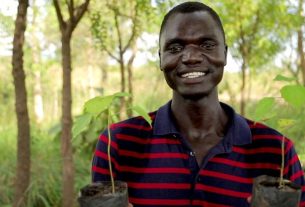(Berlin) – The European Union is adopting an important new law to require EU-based companies to ensure that their imports and exports are “deforestation-free” and uphold human rights, Human Rights Watch said today. The law establishes the legal requirements for European businesses regarding biodiversity loss and human rights abuses embedded in their international supply chains.
On April 19, 2023, The European Parliament voted for the European Union Deforestation-Free Products Regulation (EUDR); the Council of the European Union is expected to also approve it in late April, ushering its entry into force shortly after.
“European agribusiness companies have made numerous voluntary commitments regarding their supply chains, but they have not eradicated deforestation and human rights abuses,” said Luciana Téllez Chávez, environment researcher at Human Rights Watch. “Binding regulations such as the EU Deforestation-Free Products Regulation are necessary to hold companies accountable for the environmental and human rights impacts of their global operations.”
The Deforestation-Free Products Regulation puts the onus on companies registered in EU member states to ensure that the wood, palm oil, soy, coffee, cocoa, rubber, and cattle they import or export have not been produced on land that was deforested after December 31, 2020. The law requires companies to trace the commodities back to the plot of land where they were produced, or, in the case of cattle, the particular locations where the animals were raised.
The regulation also requires companies to ensure that these seven agricultural commodities are produced in conditions that comply with “relevant laws” in their country of origin. These include laws on land use rights; labor rights; human rights protected under international law; free, prior, and informed consent, as set out in the United Nations Declaration on the Rights of Indigenous Peoples; and anti-corruption laws.
Deforestation is second only to fossil fuels as a global source of greenhouse gas emissions fueling the climate crisis. Globally, industrial agriculture is the most significant driver of deforestation. Industrial agriculture has been linked to a range of human rights abuses, including forced and child labor, dangerous exposure to toxic pesticides, forced evictions and displacement, encroachment on Indigenous peoples’ traditional territories, and violence and intimidation against environmental defenders, among others.
The EU imports billions of euros worth of timber and agricultural commodities annually from all over the world. The volume of deforestation associated to EU imports is second only to China, according to a 2021 study by the World Wildlife Fund and Trase. Examples of deforestation related to EU imports include:
- Nearly one-tenth (9.6 percent) of Malaysia’s sawn wood exports were headed for the EU in 2021, according to the Observatory of Economic Complexity (OEC), a trade database. Malaysia’s timber sector is implicated in widespread deforestation and the reported seizure of Indigenous peoples’ lands without consultation or free, prior, and informed consent.
- Nearly half of all cocoa beans (44 percent) and more than half of cocoa paste (54 percent) imported by the EU came from Cote d’Ivoire in 2021, according to the OEC. The Cote d’Ivoire cocoa industry drives devastating deforestation, feeds the illicit timber trade, and has been repeatedly implicated in child labor.
- More than a quarter (26 percent) of leather, in terms of value, exported by Brazil is destined for the EU market, according to the Brazilian leather industry. More than half (54 percent) of all frozen beef imported by the EU came from Brazil in 2021, according to the OEC. Cattle is the single largest driver of the overwhelmingly illegal deforestation in the Amazon; the Brazilian cattle industry has also been implicated in encroaching on Indigenous territories.
- More than one-tenth (11 percent) of EU coffee imports were from Vietnam in 2021, according to the OEC. The Vietnamese coffee industry is linked to devastating deforestation and has allegedly employed children as young as six, particularly from ethnic minority groups.
- More than one-third (39 percent) of Colombia’s palm oil exports are destined to EU countries, according to the OEC. Some Colombian oil palm plantations have been associated with significant deforestation and encroachment on Indigenous territories, and have been implicated in massacres of rural communities.
European companies will also have to ensure that the commodities they produce domestically comply with the regulation, raising questions about some EU member states’ practices. In Sweden, for example, the timber industry has often encroached upon land that Sami people rely on for reindeer husbandry, a practice central to their cultural identity.
Risk benchmarking will be a cornerstone of the regulation’s successful implementation. Within 18 months after it enters into force, the European Commission will announce which producer countries – including EU member states – are deemed low, medium, or high risk based on their rate of deforestation and forest degradation, and the existence, compliance with, and effective enforcement of laws protecting human rights, the rights of Indigenous peoples, local communities, and other customary tenure rights holders, among other criteria.
Products from countries determined to be “high risk” will face tougher scrutiny by EU customs authorities and require European companies to conduct greater in-depth due diligence when sourcing from those locations.
The Commission will need to resist political pressure from trading partners and the EU’s own members to ensure the benchmarking accurately reflects conditions on the ground and contributes to effective enforcement of the regulation, Human Rights Watch said.
Larger companies will have 18 months after the regulation enters into force to make changes to comply with the law before facing penalties for violations. While member states will determine the exact penalties, the regulation establishes a baseline for all countries’ fines. Member states should strive to harmonize penalties to prevent them from becoming safe havens for tainted commodities, Human Rights Watch said.
The regulation enables interested parties to challenge EU authorities if they believe the EU has failed to adequately enforce the regulation. This will provide avenues for redress for communities affected by companies’ operations and contribute to stronger enforcement, Human Rights Watch said. Member states should ensure that such avenues are operational no later than 18 months after the regulation enters into force.
Effective implementation will depend on EU member states appointing competent enforcement authorities, as well as ensuring that these authorities and customs officials have the appropriate training and resources to obtain compliance, Human Rights Watch said. Member states should also set genuinely dissuasive penalties so that fines do not simply become part of operational costs.
The EU should also cement partnerships that support major producer countries in building sustainable supply chains and effective environmental enforcement mechanisms, as foreseen in the regulation. These partnerships should also contribute toward supporting producer countries to meet their own targets under the Paris Agreement on Climate Change and the 2022 Global Biodiversity Framework, Human Rights Watch said.
The regulation is part of a larger trend of “demand-side” restrictions, in which major consumers of agricultural commodities are leveraging their market share to encourage sustainable production. The United Kingdom recently approved a similar regulation, and United States lawmakers introduced a similar bill in Congress. In March, the Chinese government announced an initiative with Brazil’s largest beef lobby for deforestation-free beef exports.
In coming weeks, Human Rights Watch will work with local and international organizations to leverage evidence and policy recommendations to support the creation of a robust implementation architecture.
“The EU Deforestation-Free Products Regulation holds much promise, but its effectiveness will come down to strict implementation by every single EU member state and the tangible support the EU will offer trading partners to promote compliance,” Téllez Chávez said.



